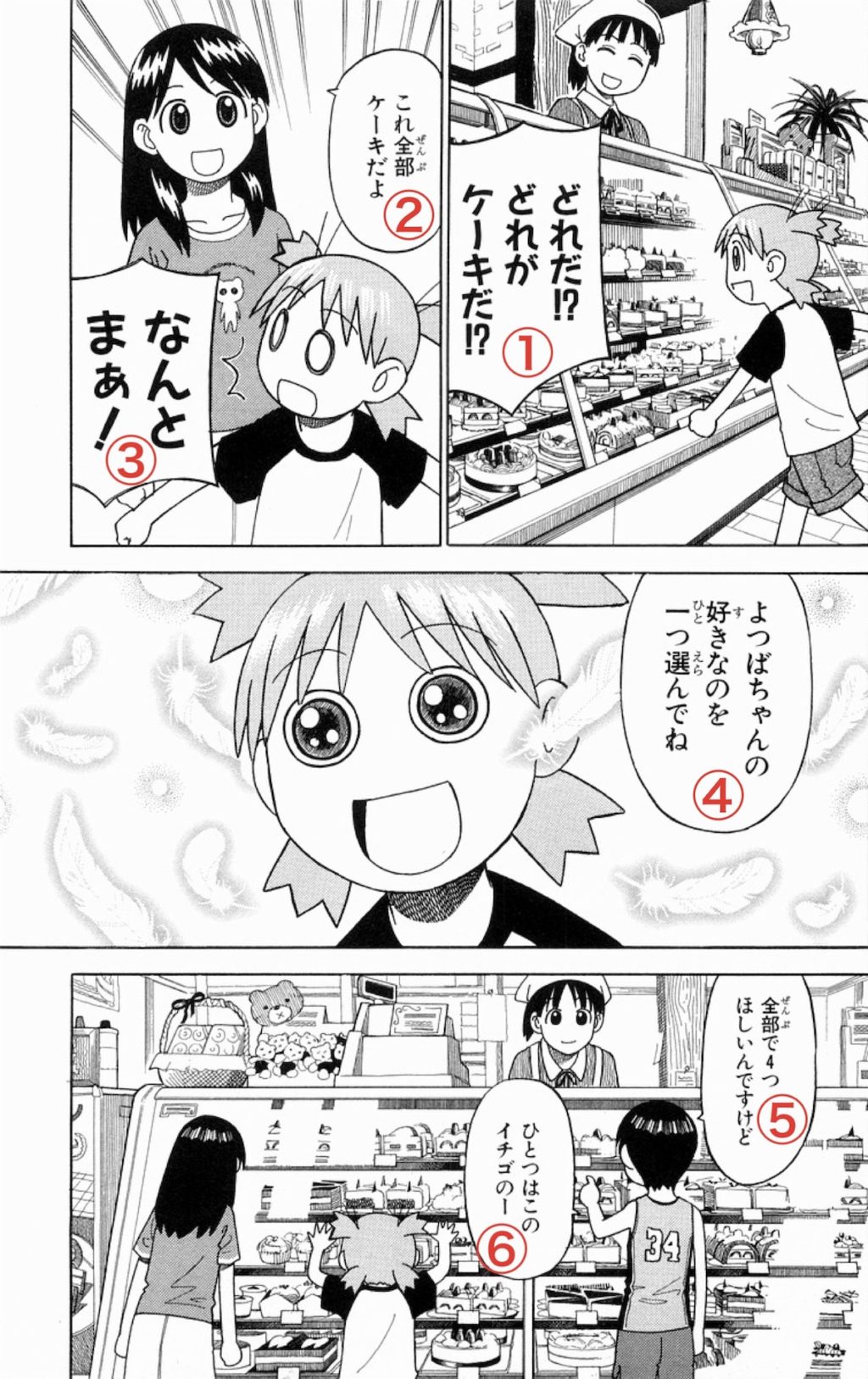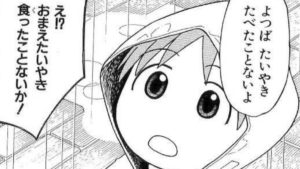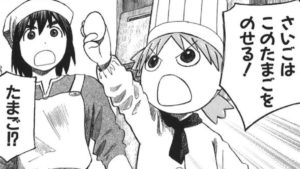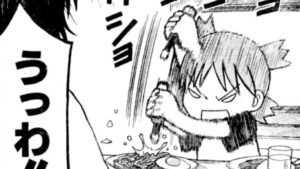Let’s learn Japanese with our analysis of manga. We will analyse a manga snippet from Yotsubato! (よつばと!) Volume 2.
CONTENTS
Manga Snippet
Sentences
Mouseover (tap on a smartphone/tablet) to reveal the censored romaji and English translation.
-
どれだ!?どれがケーキだ!?
dore da!? dore ga kēki da!?
Which one!? Which one is a cake!? -
これ全部ケーキだよ
kore zenbu kēki da yo
All of these are cakes. -
なんとまぁ!
nanto mā!
Oh dear! -
よつばちゃんの好きなのを一つ選んでね
yotsuba-chan no sukina no o hitotsu erande ne
Choose your favourite one, Yotsuba-chan. -
全部で4つほしいんですけど
zenbu de yottsu hoshiindesu kedo
We would like to get four in total… -
ひとつはこのイチゴのー
hitotsu wa kono ichigo nō
One will be this strawberry…
Analysis of Manga
-
「どれだ!?どれがケーキだ!?」
- どれ (noun) – which one
- だ (auxiliary) – makes a sentence declarative (attached to a noun or na-adjective)
- が (particle) – indicates subject
- ケーキ (noun) – cake
-
「これ全部ケーキだよ」
- これ (noun) – these
- 全部 (noun) – all
- ケーキ (noun) – cake
- だ (auxiliary) – makes a sentence declarative (attached to a noun or na-adjective)
- よ (particle) – indicates certainty/emphasis
-
「なんとまぁ!」
- なんとまぁ! (expression) – expresses one’s surprise or amazement; wow!, oh my!
-
「よつばちゃんの好きなのを一つ選んでね」
- よつば (noun) – name of the main character meaning four (よつ) leaves (ば)
- ちゃん (suffix) – shows one’s sense of intimacy/affection toward someone; honey, sweetie
- の (particle) – used to substitute “ga” in subordinate clauses EXAMPLES
- 好きな (na-adjective) – favourite
- の (particle) – makes an adjective into a noun; one, thing EXAMPLES
- を (particle) – indicates direct object of action
- 一つ (noun) – one
- 選んで (verb) – choose
- ね (particle) – indicates request for confirmation/agreement; yeah? ok? EXAMPLES
-
「全部で4つほしいんですけど」
-
「ひとつはこのイチゴのー」
- ひとつ (noun) – one
- は (particle) – indicates sentence topic
- この (adjective) – this
- イチゴ (noun) – strawberry
- の (particle) – modifies a noun ケーキ which is omitted
Examples
の (used to substitute “ga” in subordinate clauses)
これは私の作ったマフィンです。
kore wa watashi no tsukutta mafin desu.
These are muffins that I made.
先生の言ったことは正しい。
sensei no itta koto wa tadashii.
What the teacher said is right.
の (makes an adjective into a noun)
おいしいのはマフィンだけじゃないよ。
oishii no wa mafin dake janai yo.
It is not just muffins that are delicious.
一番大事なのは諦めない心です。
ichiban daiji nano wa akiramenai kokoro desu.
The most important thing is the spirit to never give up.
ね (indicates request for confirmation/agreement)
明日7時にうちに来てね。
ashita shichi ji ni uchi ni kite ne.
Come to my place at 7 o’clock tomorrow, ok?
来年また会おうね。
rainen mata aō ne.
Let’s meet again next year, yeah?
んです (makes a sentence into an explanation)
先生、昨日からお腹が痛いんです。
sensei, kinō kara onaka ga itaindesu.
Doctor, I’ve had a stomachache since yesterday.
ちょっと話したいことがあるんです。
chotto hanashitai koto ga arundesu.
I just have something I want to talk about.
けど (used to introduce an added statement)
この前みた映画だけど、とても良かったよ。
konomae mita eiga dakedo, totemo yokatta yo.
About the movie I saw the other day, it was very good.
この文法について聞きたいんですけど、今お時間ありますか?
kono bunpō ni tsuite kikitaindesu kedo, ima ojikan arimasu ka?
I want to ask about this grammar but, do you have time now?
Support Easy Peasy Japanesey
If you enjoy our content, please consider supporting Easy Peasy Japanesey. Your support will help keep us going. Thanks for all your support!



